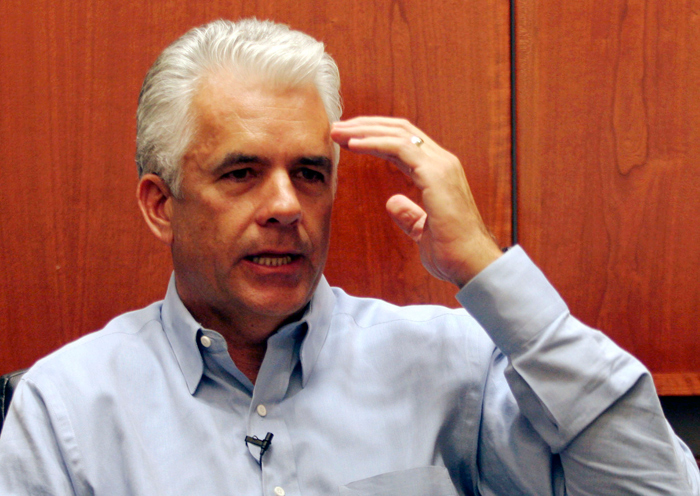Scandal-scarred Sen. John Ensign (R-NV) may have hoped resigning would keep quiet unsavory details and new charges surrounding his affair with a top staffer’s wife, but he’s not off the hook yet.
The Senate Ethics Committee issued a rare statement Friday signaling it would continue its investigation of Ensign’s affair and steps he took to keep it quiet despite having formally resigned his Senate seat. Sens. Barbara Boxer (D-CA) and Johnny Isakson (R-GA), the top Democrat and Republican on the panel respectively, said his resignation is “appropriate” and indicated they would wrap up work on the probe as soon as possible.
“The Senate Ethics Committee has worked diligently for nearly 22 months on this matter and will complete its work in a timely fashion,” they said in the statement.
There was no indication of just how thoroughly the panel would pursue the case with Ensign gone or whether they would wrap up what they have already found and issue a report before his departure date of May 3.
Usually ethics committee investigations, as well as Justice Department criminal probes of lawmakers, come to a screeching halt when members of Congress resign.
Members of the ethics committees in the House and Senate have sometimes claimed they technically no longer have jurisdiction over the former lawmakers’ activities once they leave office. But ethics experts say those explanations have served as convenient excuses for members of ethics panels, who normally dislike policing their peers, to let it die and prevent the panel from having to take a stand on the alleged violations one way or the other.
Meredith McGehee, the policy director of the Campaign Legal Center, said she hopes the Ethics Committee will continue thoroughly investigating the Ensign case and devote as much time as needed to it. In February the panel announced the hiring of a special counsel to probe the matter in order to prevent personal conflicts-of-interest among senators on the ethics committee from getting in the way of the case.
“I hope they do,” McGehee tells TPM. “Otherwise, this whole affair would just have been swept under the carpet. There is a need to get accurate information out there about what happened and I hope they will indeed issue a final report.”
The case should also serve as a reminder, McGeehee said, that the Senate refused to establish its own outside ethics investigative office, unlike the House, which formed the independent Office of Congressional Ethics (OCE) three years ago to try to better police members’ behavior.
“The Senate still needs a routine way to investigate matters expeditiously and with credibility,” she continued. “While outside or special counsel can be useful, that’s such a high bar to hurdle that it becomes a decision point.”
Ensign, 53, announced late Thursday afternoon that he would leave the Senate entirely on May 3, citing “wear and tear on this family.” He previously had said he would not seek reelection.
The resignation is two years in the making. In the summer of 2009, Ensign acknowledged having had an affair with the Cynthia Hampton, the wife of one of his top aides, Doug Hampton. She served as a staffer for the Ensign campaign. Formal accusations and charges have focused on the great lengths — and potentially illegal steps — Ensign took to keep the affair quiet, including having his parents (wealthy Las Vegas casino owners) pay the Hampton $96,000 in hush money.
Ensign was also accused of knowingly helping Doug Hampton violate the one-year lobbying ban by helping him set up a short-lived career on K Street.
The resignation also comes nearly one month after federal prosecutors charged Doug Hampton with seven counts of violating conflict-of-interest laws. In December Ensign said the Justice Department had told him he was no longer a target in its probe, but shortly after the Ethics Committee’s hiring of a special counsel to continue its investigation, Ensign said he would retire instead of seeking reelection.
The Federal Election Commission said the $96,000 payments did not violate campaign-finance law because they were paid in installments to the Hamptons and their children in amounts allowed under U.S. tax law.
Still insisting he did nothing wrong, Ensign Thursday afternoon said he decided it was time to go after the Ethics Committee named a special prosecutor to continue looking into the matter, even though he believed the Justice Department had dropped its case and the FEC has dismissed the accusations against him.
“I was hopeful that, with the closure of these investigations against me, the wear and tear on my family would soon be over. This was not the case,” he said.
“As is its right, the Senate Ethics Committee is continuing its investigation of issues into which it has been inquiring for the past year and a half,” he continued. “Indeed, the committee even decided recently to devote more resources to its investigation by hiring an outside counsel, even though the issues have been viewed and reviewed by so many others.”
In his statement, Ensign said that he could no longer deal with the Ethics Committee’s intense scrutiny of the affair and the ethical issues.
“While I stand behind my firm belief that I have not violated any law, rule, or standard of conduct of the Senate, and I have fought to prove this publicly, I will not continue to subject my family, my constituents, or the Senate to any further rounds of investigation, depositions, drawn out proceedings, or, especially public hearings,” he said.
Ryan J. Reilly contributed to this report.






